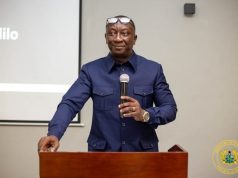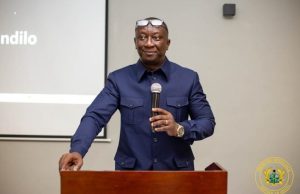By: Franklin ASARE-DONKOH
Some selected journalists from the Central and Western regions of Ghana have undergone a two-day virtual workshop on nuclear energy.
The workshop, organised by Nuclear Power Ghana (NPG), the body in charge of the country’s nuclear power agenda, was designed to build the capacity of media outlets and reporters on nuclear energy issues and NPG’s activities.
The session brought together media professionals and nuclear energy experts to discuss Ghana’s nuclear power roadmap, address public misconceptions, and enhance reportage on nuclear power and green energy-related journalism.
Energy Economist and Planner at the Nuclear Power Institute (NPI) of the Ghana Atomic Energy Commission (GAEC), Mr. Mark Amoah Nyasapoh — one of the many experts who led sessions — stated emphatically in an interview with GBCGHANAONLINE’s Franklin ASARE-DONKOH that nuclear energy is the ultimate solution to Ghana’s energy challenges.
Mr. Nyasapoh addressed persistent misconceptions about nuclear power, debunking three major myths with facts and statistics, and described nuclear fuel as “packed with power” and a sustainable solution to end Ghana’s long-standing power instability issues, popularly known as Dumsor.
“We need nuclear as a baseload either to augment or help with fixing stability and sustainability in the power sector to ensure the energy security we need,” he said.
He further explained that nuclear energy boasts the highest capacity factor at 92.3%, outperforming all other power sources.
Describing nuclear energy as the “energy superstar,” Mr. Nyasapoh emphasised its role as a baseload power source critical for national development.
According to him, nuclear is not just powerful — it is the cleanest and safest form of energy available today, making it the ideal candidate to support the government’s proposed 24-hour economy policy, championed by President John Mahama, which demands a stable and affordable power supply.
“The energy of the future is already here. Nuclear power promises cheaper electricity and long-term energy reliability for the country,” he reiterated.
Meanwhile, the Executive Director of NPG, Dr. Stephen Yamoah, in his presentation, took journalists through the steps taken by the country through his outfit and other supporting institutions.
Outlining the roadmap for Ghana’s nuclear power project, Dr. Yamoah explained that the country is following a well-structured, three-phase approach aligned with international best practices.
This framework is broken into three phases and corresponding milestones:
Phase 1 – Consider: National decision-making and feasibility studies
Phase 2 – Prepare: Infrastructure development and contracting
Phase 3 – Construct: Construction and commissioning of nuclear power plants
With milestones:
Milestone 1 – Decide
Milestone 2 – Contract
Milestone 3 – Commission
Dr. Yamoah stressed that this structured approach ensures Ghana meets all technical, regulatory, and safety benchmarks before fully rolling out nuclear power.
In another presentation, the Acting Manager for Localisation and Stakeholder Support at the Nuclear Power Institute, Mr. George Appiah, emphasised the importance of winning public trust.
He highlighted the need for a public licence — essentially securing public approval — and ensuring transparency throughout the nuclear power journey.
Mr. Appiah also acknowledged the importance of establishing a credible and independent regulator capable of managing crisis communication, handling emergencies, and countering misinformation.
He called for proactive communication strategies that address public concerns directly and help build lasting confidence in the country’s nuclear programme.















